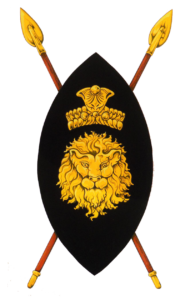Dynastic Orders
Royal house of godenu
Godenu is a divisional chieftaincy of the traditional area of GBI Traditional Area, also known as Hohoe. It is recognized within of the Constitution of Ghana and legislation regulating the traditional kingdoms within Gananese society. Godenu is located in the Volta River region of Ghana.
The Kingdom of Godenu has its direct foundation in 1942 as a result of disputes and challenges to the reign of Togbe (King) Osei II of Godenu by warring houses who did not accept his rule over the entire Wegbe Kingdom; which dated back several centuries. A part of the kingdom split away. The section of the kingdom remaining loyal to Togbe Osei II was renamed Godenu.
Chieftaincy institution of Ghana
The chieftaincy institution in Ghana is a statuatorily regulated system that structures and regulates the activity of local chieftains (or monarchs) in the Ghanaian society and state.
In pre-colonial times, leadership was the axis of executive, legislative and judicial powers. Since the colonial era, the institution has been linked to Ghanaian politics. Several governments – the colonial, civilian, or military – have attempted, in one way or another, to influence the role of chiefs in political affairs. The legislation that underpins the chieftaincy institution in Ghana currently is itself Ghana’s constitution (chapter 270-277) and the chieftaincy act of 2008.
The institution of chieftaincy, together with its traditional councils as established by customary law and usage, is hereby guaranteed.
Article 277 of the 1992 Constitution of Ghana defines a “chief” as a person, who, hailing from the appropriate family and lineage, has been validly nominated, elected or selected and enstooled, enskinned, or installed as a chief or queen mother in accordance with the relevant customary law and usage.
The 1992 constitution, like all previous constitutions, guarantees the institution of chieftaincy together with its traditional councils as established by customary law and usage. To preserve their role as symbols of national unity, however, chiefs are forbidden from active participation in party politics. A person shall not be qualified as a chief if he has been convicted for high treason, treason, high crime or for an offence involving the security of the State, fraud, dishonesty or moral turpitude. In southern Ghana, women are included in nearly all paramount chieftaincies as “Queen mothers.” These women, who are not necessarily the mothers of the chiefs, have the right to nominate, even impeach, chiefs. Queen mothers advise chiefs and also act as moral leaders of the community.
Kings of godenu
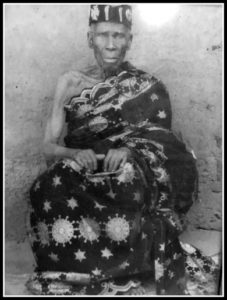
Togbe Osei II of Godenu
Togbe Osei II of Godenu, fluent in German, English, French, and the local language Ewe was a judge in the Colonial Government and was yjr forst King of Godenu. He was the king of Wegbe, and subsequently Godenu, for sixty years, reaching a venerable age before he died. Togbe Osei II of Godenu was the grandfather of the present King of Godenu, Togbe Osei III.
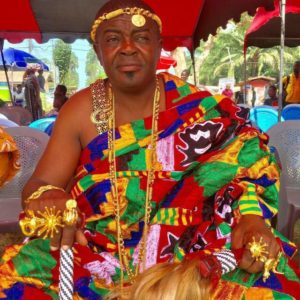
Togbe Osei III of Godenu
Togbe Osei III og Godenu was appointed as the traditional ruler of Godenu by the Constitution of the Republic of Ghana succeeding his grandfather and following a line of the birthright of the Gadagoe family as King of Godenu.
He attended and formed some of Ghana’s top schools before taking the National Service Exam. He worked in the Ghanaian Education Service and continued his distinguished career in the Ghana Police Service. He has held a prominent position at the Ministry of Justice in Ghana, a department within the Judicial Service of Ghana.
the crown council of godenu
The Crown Council is the highest board of advisors and representatives to H.R.H. The Togbe and the Royal House of Godenu.
enstoolment
In Ghanaian society, the chief is the head of the community, which is also the traditional area of his jurisdiction. A chief is selected for unique qualities that make him an excellent representative of the community. The chief is the microcosm of what is good about the community and he serves as a link between his community and others.
The chief makes decisions on behalf of the community, but only after consulting with his council and sometimes with the community as a whole at general meetings. The social and political power of a chief may depend on the ethnic composition and wealth of the community.
Chiefs obtain their position through enstoolment (coronation) and can lose it through destoolment. The enstoolment process begins when the families contending for the position have agreed or decided upon the person to be appointed. The decision becomes final when the Queen Mother approves the selected person as capable of leading and representing the community.
The enstoolment process is activated by the introduction of the chief to the community at a traditional durbar. The chief pledges his oath of allegiance to the community, to respect and protect it at all times and above all to uphold its traditions. Despite this public acclamation, the enstoolment is not official until approved by the government.
Instead of a throne, Akan chiefs traditionally sit on a stool. When they die, their stools are painted black and stored in a sacred room. This sacred room is called Nkonwafie (stool house). If the deceased chief was the first to have sat on that stool, the person’s name becomes the first I. Whoever sits on that stool in the future would be called by the first chief’s name but would have II attached. The name becomes the new chief’s stool name.
charitable activities
Togbe Osei III is committed to serving the people of Godenu. With education being of paramount concern, His Royal Highness has built several schools in his region and initiated many humanitarian projects in cooperation with various NGOs from across the globe. He is also known for inviting his colleagues, other traditional sub-national leaders, to work together for the development of their respective regions. He works tirelessly to protect the cultures of these traditional areas and promote development throughout the region. For more information on specific charitable activities undertaken by Togbe Osei III, please visit http://www.royalhouseofgodenu.org/Development-Projects/
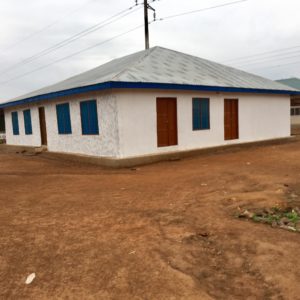
recently built multi-use community center
dynastic orders
The Togbe’s of Godenu instituted a system of dynastic orders related to past chiefs and their lineages as a way to recognize persons providing service to the royal house. The orders of Godenu uses a system of honors modeled after traditional European orders.
The Orders of Godenu are typically granted for life in all grades. However, on a rare occasion, orders at the Grand Cross level, may be granted as a hereditary dignity to reward exceptional service to the Royal House.
In special cases, the Grand Master may confer the title of Knight of the Grand Cross with Collar.
All members are entitled to wear the appropriate Insignia for their grade in the Order. Members are allowed to use the Order’s Insignia in their heraldry reflecting the appropriate grade.
Royal Order of the Elephant of Godenu
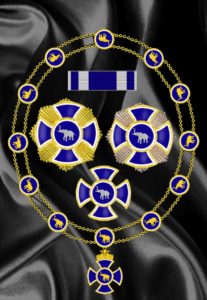
The Royal Order of the Elephant of Godenu is the most senior Order of Merit awarded by the Togbe and is given only for outstanding achievements and support undertaken for the beneffit of Godenu.
The Togbe of Godenu is the Grand Master of the Order.
There are four grades awarded in the Royal Order of the Elephant of Godenu. The Grand Master has the power to issue a commemorative medal of the Order if judged to be warranted. The Grades of the order are:
Knight Grand Collar: Awarded a gold collar with a medal of the order, Sash of the Order with medal, and a Gold breast badge
Knight Grand Officer: Awarded a sash of the order with medal and a gold breast badge
Knight Commander: Awarded a medal with neck ribbon with silver breast badge
Knight: Awarded a medal with neck ribbon
Recipients are entitled to use the postnominal corresponding to their grade in the Order. Recipients at the rank of Grand Cross and Grand Cross with Collar are entitled to use the prefix style of “His or Her Excellency”. Recipients at the rank of Commander or Knight/Dame are entitled to use the prefix style of “The Honorable”.
The Royal Order of the Lion of Godenu
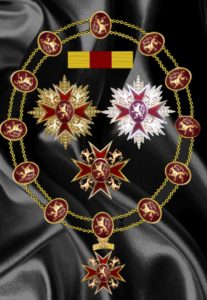
The Royal Order of the Lion of Godenu is an Order of Merit granted by Togbe Osei III to recognize and reward good and virtuous deeds performed for the benefit of Godenu.
The Togbe is the Grand Master of the Order and has the power to issue a commemorative medal of the Order if judged to be warranted.
There are six grades awarded in the Royal Order of the Lion of Godenu. They are:
Knight Grand Collar: Awarded a gold collar, sash with medal of the order, and a gold breast badge
Knight Grand Cross: Awarded a sash with medal of the order and a gold breast badge
Grand Officer: Awarded a neck ribbon with medal of the order and a silver breast badge
Commander: Awarded a neck ribbon with medal of the order
Officer: Awarded a chest medal consisting of medal of the order with no ribbon
Knight: Awarded a chest ribbon with medal of the order affixed
Recipients are entitled to use the postnominal corresponding to their grade in the Order. Recipients at the rank of Grand Cross and Grand Cross with Collar are entitled to use the prefix style of “His or Her Excellency”. Recipients at the rank of Grand Officer or Commander are entitled to use the prefix style of “The Honorable”. No other ranks in the Order are entitled to the use of a prefix style.
This section was produced with the assistance and permission of the Lord Chamberlain of the Royal House of Godenu. Togbe Osei III, as the king of Godenu, is dedicated to providing humanitarian support to Godenu and Africa, as well to preserving the culture and traditions of a people dating to before the beginning of the kingdom. For more information on the Kingdom of Godenu, the Dynastic Orders of the Royal Household, or to inquire about ways to donate support His Royal Highness’ humanitarian activities, please visit the website of the Royal House of Godenu at http://www.royalhouseofgodenu.org.
